|
 Secure Site
Secure Site
|
 |
Archive for May, 2012
 morning meditation practice with meditation timer Sense the Stillness
You don’t have to be a regular yoga or meditation practitioner to reap the benefits of a morning meditation ritual. Start with five minutes daily, using the guidelines that follow. Then over the course of a few weeks — or when you are ready — gradually work up to 10 minutes. Remember, with meditation it’s quality, not quantity, that matters.
Start with awareness. Rather than lunge out of bed, Novie suggests waking up slowly. “Spend a few minutes just becoming conscious of the sensations of your body. Awareness is such a beautiful way of entering your day.” Once you’re up, resist the temptation to check your e-mail, flip on the radio, or do any of the other countless things that draw you out of yourself and into the concerns of the world. Instead, keep the focus inward.
Find a comfortable spot. Practice your five minutes of meditation anywhere you like (the bedroom floor, a favorite chair) except the bed, where you may fall back to sleep. Be sure to set your Singing Bowl Meditation Timer (Now & Zen, $199.95) for 5 minutes so that your session can end with a calm chime. To enhance the sacred aspect of her meditation space, Novie set up a small altar in her living room that she uses only for meditation, giving the space a positive energy of its own.
Sense your breath. Close your eyes. Feel your breath moving in and out of your body without controlling it. Bring your attention to the rise and fall of your abdomen or to the tip of your nose. The more awareness you bring to breath and body, the more grounded in your body you’ll become. This, in turn, will help relieve some of the stress that comes with getting through your morning.
Don’t try to block your thoughts. Your mind will wander — that’s what it’s designed to do. Rather than try to fight off thoughts as they emerge, acknowledge them, but don’t engage them. And give yourself some slack — meditation is, after all, a practice, not perfection.
For yoga instructor Alison Novie, mornings make an ideal time for meditation — perhaps more than any other time of day. “The sun’s about to rise, but it’s still sort of dark and quiet,” says Novie, who wakes at 5:00 a.m. to meditate. “I get up, brush my teeth, light a candle, and then sit for half an hour. The calm energy I get from that morning meditation carries me through the day.”
adapted from Body + Soul Magazine, March 2006
Our Singing Bowl Meditation Timer called The Zen Timepiece is an acoustic 6-inch brass bowl-gong clock. It is the world’s ultimate alarm clock, practice timer, and “mindfulness bell.”
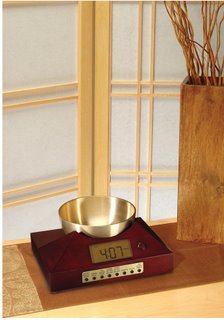 Singing Bowl Meditation Timer is Ideal for Morning Meditation Practice
Now & Zen’s Singing Bowl Meditation Timer Shop
1638 Pearl Street
Boulder, CO 80302
(800) 779-6383
Posted in Chime Alarm Clocks, Meditation Timers, Meditation Tools, mindfulness practice, Well-being, Zen Timers
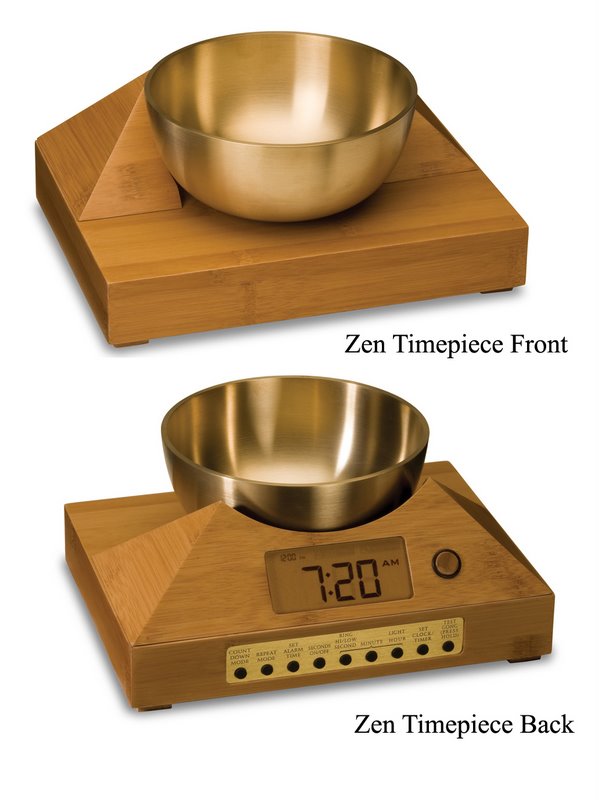 Alternative to Beeping Alarm Clocks...Tibetan-Singing Bowl Alarm Clock Use The Zen Chime Alarm Clocks with Acoustic Sounds as an Alternative to Shocking Alarm Clock Sounds
Our Zen Timepiece’s acoustic 6-inch brass bowl-gong clock is the world’s ultimate alarm clock, practice timer, and “mindfulness bell.” It is like no other Alarm Clock. It eliminates the need for Beeping Alarm Clocks!
Instead, it fills your environment with beautifully complex tones whenever it strikes. In the morning, its exquisite sounds summon your consciousness into awakening with a series of subtle gongs that provide an elegant beginning to your day. Once you experience the Zen Timepiece’s progressive awakening, you’ll never want to wake up any other way. It also serves as the perfect meditation timer. Available in 5 wood styles, including bamboo (shown above).
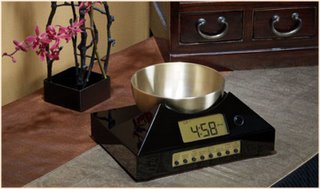 Zen Timepiece Black - Eliminate Your Beeping Alarm Clock Our Zen Timepiece’s acoustic 6-inch brass bowl-gong clock is the world’s ultimate alarm clock, practice timer, and “mindfulness bell.” It fills your environment with beautifully complex tones whenever it strikes. In the morning, its exquisite sounds summon your consciousness into awakening with a series of subtle gongs that provide an elegant beginning to your day. Once you experience the Zen Timepiece’s progressive awakening, you’ll never want to wake up any other way. It also serves as the perfect meditation timer. Available in 5 wood styles, including bamboo (shown).
 Eliminate Beeping Alarm Clocks, Zen Chime Alarm Clocks are an Alternative! Now & Zen Headquarter Store
1638 Pearl Street
Boulder, CO 80302
(800) 779-6383
Posted in Chime Alarm Clocks, Natural Awakening
 The Zen Alarm Clock transforms mornings, awakening you gradually with a series of gentle acoustic chimes Once you use a Zen Clock nothing else will do But women cope better than men with a bout of mild sleep deprivation, study finds
Men and women who get just six hours of sleep each night during the workweek will need more than the weekend to recover from the cumulative effects of this mild sleep deprivation, a new study revealed.
Researchers also found that women are better able to cope with and recover from this kind of sleep loss than men.
“The usual practice of extending sleep during the weekend after a busy workweek associated with mild sleep loss is not adequate in reversing the cumulative effects on cognitive function resulting from this mild sleep deprivation,” said the study’s principal investigator Dr. Alexandros N. Vgontzas, professor of psychiatry and endowed chair in sleep disorders medicine at the Penn State College of Medicine, in an American Academy of Sleep Medicine news release.
In the study, researchers installed 34 people, with an average age of 25 years and no sleep problems, in a sleep lab for 13 nights. There, they periodically measured sleepiness and performance. Participants were allowed to sleep eight hours a night for the first four nights to assess their typical functioning. For the next six nights, however, they were allowed to sleep only six hours a night, followed by three “recovery” nights of 10 hours of sleep each night.
The study’s findings, slated for presentation on Wednesday at Associated Professional Sleep Societies meeting in Minneapolis, revealed that after a week of sleep restriction, two nights of extra sleep are not enough to fully reverse the adverse effects of the sleep loss.
Men and women showed both significantly decreased performance on psychomotor tests, as well as subjective and objective sleepiness.
Women recovered better than men, however, the study pointed out. The researchers said the gender differences were linked to slow wave, or deep sleep, considered the restorative potion of sleep.
 Waking up in the morning should be as pleasant as falling asleep at night. The Zen Alarm Clock's gradual, gentle awakening is transformative. “In women, but not in men, deep sleep appeared to have a protective effect,” added Vgontzas, who is also director of the Sleep Research and Treatment Center at Penn State in Hershey, Pa. “Women with a higher amount of deep sleep can handle better the effects of one workweek of mild sleep deprivation, and their recovery is more complete after two nights of extended sleep.”
More information: The U.S. National Institute of Neurological Disorders and Stroke provides more information on sleep. — Mary Elizabeth Dallas
SOURCE: American Academy of Sleep Medicine, news release, June 15, 2011
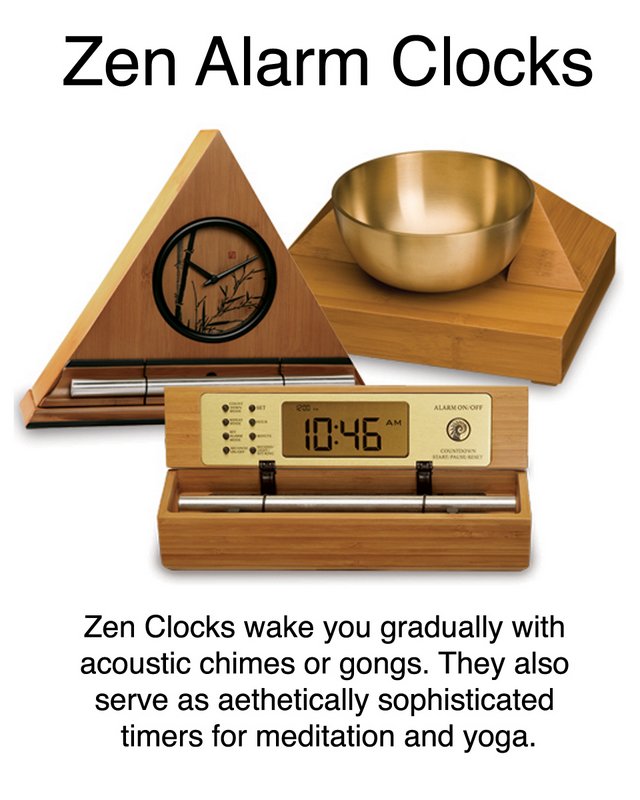 Wake up with gradual, beautiful acoustic chimes. The Zen Alarm Clock transforms your mornings and gets you started right, with a progressive awakening Now & Zen – The Soothing Chime Alarm Clock Store
 Wake up refreshed, love your alarm clock, transform your mornings with The Zen Alarm Clock's progressive awakening with gentle chimes. 1638 Pearl Street
Boulder, CO 80302
(800) 779-6383
orders@now-zen.com
Posted in sleep
 Waking up in the morning should be as pleasant as falling asleep at night. The Zen Alarm Clock's gradual, gentle awakening is transformative. Waking up in the morning should be as pleasant as falling asleep at night. The Zen Alarm Clock's gradual, gentle awakening is transformative. Students who improve their sleep habits may improve their academic performance, researchers say
People may be learning while they sleep, dramatically improving their memory in some cases, a new study suggests.
Although the effects on memory vary greatly and are not well understood, Michigan State University researchers said their findings reinforce the need for a good night’s sleep — something 63 percent of Americans are not getting, according to the U.S. National Sleep Foundation.
“We speculate that we may be investigating a separate form of memory, distinct from traditional memory systems,” lead researcher Kimberly Fenn, an assistant professor of psychology, said in a university news release. “There is substantial evidence that during sleep, your brain is processing information without your awareness and this ability may contribute to memory in a waking state.”
Researchers studied more than 250 people and found that some had significant enhancement in their memory, while others had no change at all. They found, however, that most participants showed improvement.
More research is needed to explore whether or not this potential memory ability could boost academic performance, the study authors said in the news release.
“Simply improving your sleep could potentially improve your performance in the classroom,” concluded Fenn.
 Wake up with gradual, beautiful acoustic chimes. The Zen Alarm Clock transforms your mornings and gets you started right, with a progressive awakening Boulder, Colorado—an innovative company has taken one of life’s most unpleasant experiences (being startled awake by your alarm clock early Monday morning), and transformed it into something to actually look forward to. “The Zen Alarm Clock,” uses soothing acoustic chimes that awaken users gently and gradually, making waking up a real pleasure. Rather than an artificial recorded sound played through a speaker, the Zen Clock features an alloy chime bar similar to a wind chime. When the clock’s alarm is triggered, its chime produces a long-resonating, beautiful acoustic tone reminiscent of a temple gong. Then, as the ring tone gradually fades away, the clock remains silent until it automatically strikes again three minutes later. The frequency of the chime strikes gradually increase over ten-minutes, eventually striking every five seconds, so they are guaranteed to wake up even the heaviest sleeper. This gentle, ten-minute “progressive awakening” leaves users feeling less groggy, and even helps with dream recall.
The study was published recently in the Journal of Experimental Psychology: General.
More information: The American Psychological Association provides more information on the importance of sleep. — Mary Elizabeth Dallas
SOURCE: Michigan State University, news release, September 2011
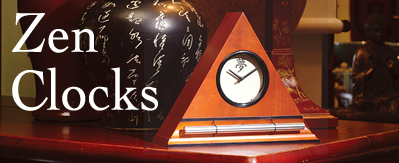 The Zen Alarm Clock transforms mornings, awakening you gradually with a series of gentle acoustic chimes Once you use a Zen Clock nothing else will do Now & Zen – The Soothing Chime Alarm Clock Shop
1638 Pearl Street
Boulder, CO 80302
(800) 779-6383
orders@now-zen.com
Posted in sleep
 Once you experience the Zen Timepiece's progressive tones, you'll never want to meditate any other way. Last week, while trying to get downtown to a conference on integrating stress-reduction techniques into mainstream medicine, I felt my blood pressure rising. I was stuck in traffic, made several wrong turns that took me to the opposite side of the city, and entered a parking garage that turned out to be full—all causing me to miss a much-anticipated keynote speaker. When I finally got to the conference, I couldn’t get beyond my disappointment over missing the opening speaker and sat in the large lecture hall, halfheartedly taking notes and checking my BlackBerry every few minutes. Let’s just say I wasn’t fully present in the moment.
At lunch, I decided to head to a roundtable discussion given by Jon Kabat-Zinn, a psychologist famous for developing a stress-reduction technique called mindfulness, which he’s described in several bestselling books. Can’t hurt, I figured, hoping that he’d begin the session with a little meditation. (You can meditate with him on this YouTube video.) While he did not, in fact, lull me into meditative relaxation, he did very much get me to a mindful state of awareness. “I know you all have questions you’d like to ask or statements you’d like to make,” he said before opening the room up for discussion, “but while you’re waiting your turn, really listen to the other people speaking instead of framing the perfect sentence in your head.”
 It serves as the perfect meditation timer. Available in 5 wood styles, including bamboo. Of course, I thought, I always do that. Then I recalled a roundtable discussion that I’d attended the day before when I was distracted the entire time by trying to get my own question answered. Why isn’t the moderator calling on me? I silently seethed and even went so far as to interrupt another participant asking a question to try to piggyback my query onto his. This time, I resolved, I wasn’t going to ask any questions and was simply going to listen. I also wasn’t going to check my BlackBerry or my watch. I wasn’t going to think about missing the morning speaker or what the traffic would be like heading to my kids’ school for the carpool later that afternoon. I was simply going to, well, be.
I was rewarded with an insider’s look at what healthcare providers discuss among themselves. Many are struggling to help patients make real lifestyle changes. A New Jersey doctor, for example, asked how to deal with a workaholic CEO (a heart attack waiting to happen) who was convinced that cutting back his 70-hour workweek would sacrifice his career. “Most of my best ideas have come out of meditation,” responded Bill George, a Harvard Business School professor and the former chairman and CEO of the healthcare firm Medtronic. “I found that constant interruptions throughout my workday at Medtronic [which has 38,000 employees] left me with incomplete thoughts. Meditation every night gave me that clarity.” So, the solution lies in convincing masters of the universe that less work is actually more—not an easy task.
“I feel like I’m always mopping up problems,” complained another physician, who heads an integrative medicine unit at a university hospital. “I wish my patients would come to me before they’re sick to learn how to stay well.” Kabat-Zinn told him it lies within his power to make his practice what he wants it to be.
Some practitioners shared their own personal stories. A nurse stood up and asked how to get her teenage kids to meditate, something she thought could help them cope with their father’s terminal illness. “I wouldn’t push them,” advised Kabat-Zinn. “That could actually repel them from ever doing it. I’d just keep meditating yourself and spend time with them appreciating the moments, and perhaps they’ll come to it on their own.”
At the end of the session, I felt the same sort of relaxed, euphoric feelings that I generally experience after a workout. It was only after I exited the session that I remembered to check my BlackBerry. Then I shut it off and headed out into the sun of an unexpectedly warm winter day. On my walk back to the parking garage, I made a point of observing sidewalk repairs, guards laughing together by a security station in front of the State Department, and the statue of an ancient Greek posed with a discus at a small park that I passed. I even marveled at the ingenuity of an inner spiral ramp that led me out of the garage. I don’t know why, but those experiences left me calm and at peace with the world, a feeling that lasted until my mind became distracted, once again, by the responsibilities of everyday life.
By SARAH BALDAUF for US News
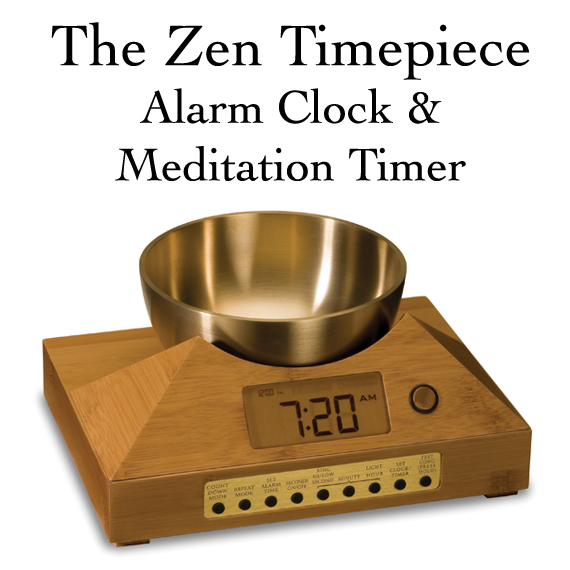 It serves as the perfect meditation timer. Available in 5 wood styles, including bamboo. Now & Zen – The Singing Bowl Meditation Timer Shop
1638 Pearl Street
Boulder, CO 80302
(800) 779-6383
orders@now-zen.com
Posted in Meditation Timers, Meditation Tools
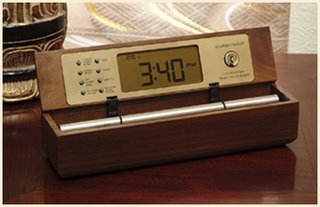 Digital Zen Alarm Clock are the Best Gradual Awakening Alarm Clocks 5 Features and Benefits of the
Digital Zen Alarm Clock:
- Feature: Wakes you gradually and gently over 10 minutes with a Tibetan bell-like chime.
Benefit: A beautiful way to wake up at home or traveling.
- Feature: A countdown timer perfect for meditation, yoga, or to end meetings on time.
Benefit: Makes yoga, mediation and meetings more relaxing and fun.
- Feature: Chimes on the hour, lighted dial, AC or battery powered, beautiful yet portable.
Benefit: A timepiece for a progressive lifestyle.
- Feature: Hardwood case, acoustic chime.
Benefit: Aesthetic pleasure.
- Feature: An interval timer that will chime repeatedly at any set sequence.
Benefit: Sets the pace of practice with a beautiful sounding chime.
 Which Alarm Clock is Best for a Gradual Awakening When the clock’s alarm is triggered, the acoustic chime bar is struck just once … 3-1/2 minutes later it strikes again … chime strikes become more frequent over 10 minutes … eventually striking every 5 seconds until shut off. As they become more frequent, the gentle chimes will always wake you up – your body really doesn’t need to be awakened harshly, with a Zen Clock you’re awakened more gradually and thus more naturally.
Now & Zen Headquarter Store
1638 Pearl Street
Boulder, CO 80302
(800) 779-6383
Posted in Natural Awakening, Now & Zen Alarm Clocks, sleep
 Meditation Practice, Stillness of Being For a formal practice to cultivate equanimity, begin with some calming breaths or a mantra meditation. Once you feel calm, reflect on your desire for happiness and freedom from suffering, both for yourself and for others. Contemplate your desire to serve the needs of others and to be compassionately engaged in the world. Acknowledge both the joy and the suffering that exist throughout the world—the good deeds and the evil ones. As you continue to breathe into your heart’s center, acknowledge the necessity of balancing your desire to make positive change in the world with the reality that you cannot control the actions of others.
Bring to mind the image of someone for whom you have no strong feelings one way or the other. With this person in your mind’s eye, repeat the following phrases to yourself, coordinating with the outbreath if you like:
- All beings like yourself are responsible for their own actions.
- Suffering or happiness is created through one’s relationship to experience, not by experience itself.
- Although I wish only the best for you, I know that your happiness or unhappiness depends on your actions, not on my wishes for you.
- May you not be caught in reactivity.
Feel free to use other similar, appropriate phrases of your own devising. After a few minutes, shift your attention to your benefactors, including teachers, friends, family and the unseen workers who keep the societal infrastructure working. Silently repeat the phrases to yourself as you contemplate these benefactors.
After several minutes, begin to reflect on your loved ones, directing the phrases to them, followed by the difficult people in your life. While feeling kindness, compassion, and joy for those we love comes more easily than it does for those with whom we have difficulty, it is often the opposite with equanimity. It’s a lot easier to accept that those we dislike are responsible for their own happiness than it is for those we care for deeply, because we feel more attachment to them. Whatever your experience, simply note any reactivity and see if you can be equanimous with your reactivity! Broaden your reach after a few minutes to include all beings everywhere throughout the world, and then finally contemplate equanimity in regard to yourself, noticing how taking responsibility for your own happiness and unhappiness can feel the hardest of all.
- All beings, including myself, are responsible for their own actions.
- Suffering or happiness is created through one’s relationship to experience, not by experience itself.
- Although I wish only the best for myself, I know that my happiness or unhappiness depends on my actions, not my wishes for myself.
- May I not be caught in reactivity.
adapted from Yoga Journal by Frank Boccio
Frank Jude Boccio is a teacher of yoga and Zen Buddhism and the author of Mindfulness Yoga. Find him at mindfulnessyoga.net.
 Meditation Timer for Your Meditation Practice The Walnut Digital Zen Clock’s long-resonating Tibetan bell-like chime makes waking up and meditating a beautiful experience – its progressive chimes begin your day with grace. When the clock’s alarm is triggered, the acoustic chime bar is struck just once … 3-1/2 minutes later it strikes again … chime strikes become more frequent over 10 minutes … eventually striking every 5 seconds until shut off. As they become more frequent, the gentle chimes will always wake you up or bring you out of your meditation. Your body really doesn’t need to be awakened harshly, with a Zen Clock you’re awakened more gradually and thus more naturally. Unlike artificial recorded sounds coming out of a tiny speaker in a plastic box, natural acoustic sounds transform your bedroom or office environment.
The Digital Zen Clock also serves as a countdown and interval timer for yoga, meditation, bodywork, etc.; and it can also be set to chime on the hour as a tool for “mindfulness.”
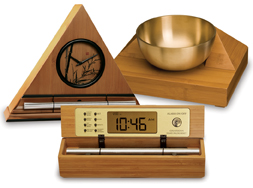 Find the Entire Family of Meditation Timer and Gongs at Now & Zen's Store in Boulder Now & Zen’s Meditation Timer Store
1638 Pearl Street
Boulder, CO 80302
(800) 779-6383
Posted in intention, Meditation Timers, Meditation Tools, mindfulness practice, Well-being, Zen Timers
 Once you experience the Zen Timepiece's progressive tones, you'll never want to meditate any other way. It serves as the perfect meditation timer. KOITSU -- Full Moon at Akashi Beach Study authors say earlier use of such treatments might benefit health-care system
THURSDAY, May 12 (HealthDay News) — Mind-body therapies such as yoga, meditation and deep-breathing exercises appear to be gaining more acceptance in mainstream medicine, according to a new study.
Mind-body therapy is used by more than one-third of Americans, and that number is rising, the researchers noted. They found that one in 30 Americans using some type of mind-body therapy was referred to the treatment by a medical provider.
“There’s good evidence to support using mind-body therapies clinically,” the study’s lead author, Dr. Aditi Nerurkar, an integrative medicine fellow at Harvard Medical School and Beth Israel Deaconess Medical Center in Boston, said in a news release from Beth Israel. “Still, we didn’t expect to see provider referral rates that were quite so high.”
Nerurkar and her colleagues analyzed data from more than 23,000 households that took part in the 2007 U.S. National Health Interview Survey. Nearly 3 percent of the people in those households, or about 6.3 million people, used mind-body therapies after referral by a mainstream medical provider, the study found. These people tended to be sicker and used the health-care system more than people who started using the therapies without a referral.
“What we learned suggests that providers are referring their patients for mind-body therapies as a last resort once conventional therapeutic options have failed,” Nerurkar said. “It makes us wonder whether referring patients for these therapies earlier in the treatment process could lead to less use of the health-care system and, possibly, better outcomes for these patients.”
The study is published in the May 9 issue of Archives of Internal Medicine.
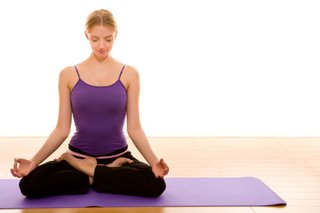 Once you experience the Zen Timepiece's progressive tones, you'll never want to meditate any other way. It serves as the perfect meditation timer. KOITSU -- Full Moon at Akashi Beach “These data suggest that mind-body therapies have really become a mainstream approach to care,” Dr. Russell Phillips, chief of primary care at Beth Israel and the study’s senior author, said in the news release. “But more research is needed to guide physician and patient decision-making regarding their use.”
Meditation is generally an inwardly oriented, personal practice, which individuals do by themselves. Meditation may involve invoking or cultivating a feeling or internal state, such as compassion, or attending to a specific focal point. The term can refer to the state itself, as well as to practices or techniques employed to cultivate the state. There are dozens of specific styles of meditation practice; the word meditation may carry different meanings in different contexts. Meditation has been practiced since antiquity as a component of numerous religious traditions. A 2007 study by the U.S. government found that nearly 9.4% of U.S. adults (over 20 million) had practiced meditation within the past 12 months, up from 7.6% (more than 15 million people) in 2002.
Although meditation can be done in almost any context, practitioners usually employ a quiet, tranquil space, a meditation cushion or bench, and some kind of timing device to time the meditation session. Ideally, the more these accoutrements can be integrated the better. Thus, it is conducive to a satisfying meditation practice to have a timer or clock that is tranquil and beautiful. Using a kitchen timer or beeper watch is less than ideal. And it was with these considerations in mind that we designed our Gong Meditation Timer. This unique “Zen Clock” features a long-resonating acoustic chime that brings the meditation session to a gradual close, preserving the environment of stillness while also acting as an effective time signal. The Digital Zen Clock can be programmed to chime at the end of the meditation session or periodically throughout the session as a kind of sonic yantra. The beauty and functionality of the Gong Meditation Time/Clock makes it a meditation tool that can actually help you “make time” for meditation in your life.
More information: The U.S. National Institutes of Health has more about mind-body therapy. — Robert Preidt
SOURCE: Beth Israel Deaconess Medical Center, news release, May 9, 2011
 The Gong Meditation Timer Shop, Boulder, Colorado Now & Zen – The Gong Meditation Timer Store
1638 Pearl Street
Boulder, CO 80302
(800) 779-6383
orders@now-zen.com
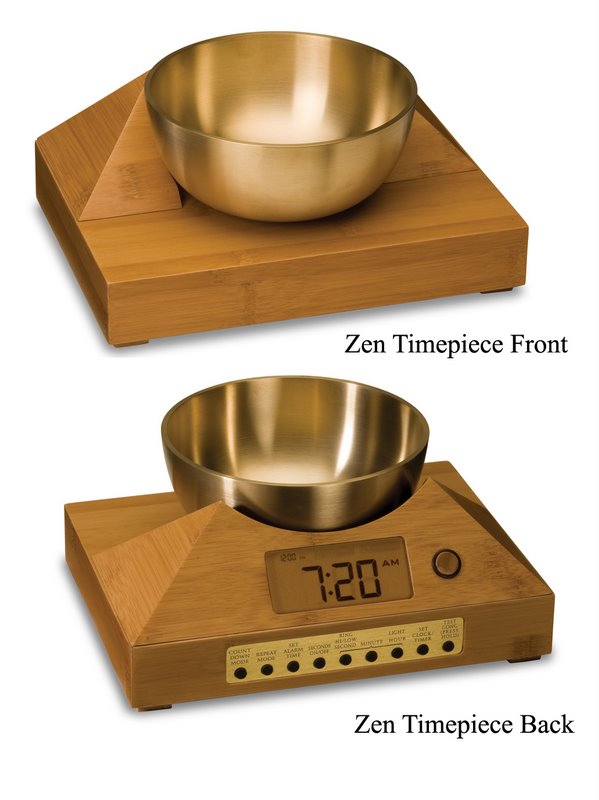 Once you experience the Zen Timepiece's progressive tones, you'll never want to meditate any other way. It serves as the perfect meditation timer.
Posted in Meditation Timers, Meditation Tools
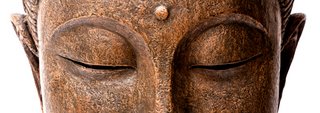 Our Yoga Timer & Clock can be programmed to chime at the end of the meditation or yoga session or periodically throughout the session as a kind of sonic yantra. Study: Even a Cram Course in Meditation Helps Reduce Pain
Meditation might beat morphine as a painkiller, new research suggests. In a small study, healthy medical students attended four 20-minute sessions to train them in “mindfulness meditation,” based on techniques such as focusing on breathing and banishing of distracting thoughts. Before and after the training, participants underwent brain scans with a pad heated to a painful 120 degrees attached to the back of their leg. They reported a 40 percent decrease in pain intensity and a 57 percent reduction in pain unpleasantness following their training. Morphine and similar drugs typically reduce pain by about 25 percent. Meditation reduced activity in key pain-processing regions of the brain, according to findings published Wednesday in the Journal of Neuroscience. “We found a big effect,” study author Fadel Zeidan, a research fellow at Wake Forest Baptist Medical Center, said in a press statement. “This study shows that meditation produces real effects in the brain and can provide an effective way for people to substantially reduce their pain without medications.”
 Bring Yourself Back to Balance Use our unique “Zen Clock” which functions as a Yoga & Meditation Timer. It features a long-resonating acoustic chime that brings your meditation or yoga session to a gradual close, preserving the environment of stillness while also acting as an effective time signal. Our Yoga Timer & Clock can be programmed to chime at the end of the meditation or yoga session or periodically throughout the session as a kind of sonic yantra. The beauty and functionality of the Zen Clock/Timer makes it a meditation tool that can actually help you “make time” for meditation in your life. Bring yourself back to balance.
By ANGELA HAUPT for US News
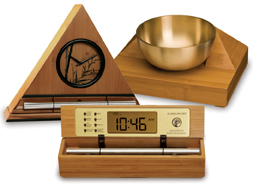 The beauty and functionality of the Zen Clock/Timer makes it a meditation tool that can actually help you "make time" for meditation in your life Now & Zen – The Chime Meditation Timer Store
1638 Pearl Street
Boulder, CO 80302
(800) 779-6383
orders@now-zen.com
Posted in Meditation Tools, mindfulness practice
 The Zen Alarm Clock transforms mornings, awakening you gradually with a series of gentle acoustic chimes. Once you use a Zen Clock nothing else will do. They have same brain activity and eye movements as healthy people while sleeping, study finds
Some patients do dream while in a minimally conscious state and are therefore likely to still have a form of consciousness about themselves and the external world, a new study says.
The researchers used electroencephalography (EEG) to compare the structure of sleep in 11 brain-damaged patients — six in a minimally conscious state and five in a vegetative state (unresponsive wakefulness).
“We used as a marker of arousal the fact that the [patient] had his/her eyes open and muscle tone, and as a marker of sleep the fact that the patient had closed eyes and muscle inactivity,” Dr. Steven Laureys, director of the Coma Science Group at the University of Liege in France, said in a university news release.
Electrical activity differed little between sleep and wakefulness in patients in a vegetative state, but the sleep of patients in a minimally conscious state was similar to that of normal sleep in a healthy person, the investigators found.
During sleep, the patients in a minimally conscious state had changes in “slow wave” activity in the front of the brain considered important for learning and brain plasticity. They also had non-rapid eye movement, slow wave sleep and rapid eye movement, which is associated with dreaming.
“Everything thus indicates that they have access to dreaming,” Laureys said. “As a result, we can legitimately suppose that they still have a form of consciousness of self in addition to a certain consciousness of the external world.”
 Waking up in the morning should be as pleasant as falling asleep at night. The Zen Alarm Clock's gradual, gentle awakening is transformative. Boulder, Colorado—an innovative company has taken one of life’s most unpleasant experiences (being startled awake by your alarm clock early Monday morning), and transformed it into something to actually look forward to. “The Zen Alarm Clock,” uses soothing acoustic chimes that awaken users gently and gradually, making waking up a real pleasure. Rather than an artificial recorded sound played through a speaker, the Zen Clock features an alloy chime bar similar to a wind chime. When the clock’s alarm is triggered, its chime produces a long-resonating, beautiful acoustic tone reminiscent of a temple gong. Then, as the ring tone gradually fades away, the clock remains silent until it automatically strikes again three minutes later. The frequency of the chime strikes gradually increase over ten-minutes, eventually striking every five seconds, so they are guaranteed to wake up even the heaviest sleeper. This gentle, ten-minute “progressive awakening” leaves users feeling less groggy, and even helps with dream recall.
The study was published in the August issue of the journal Brain.
More information: The University of Washington has more about vegetative and minimally conscious states. — Robert Preidt
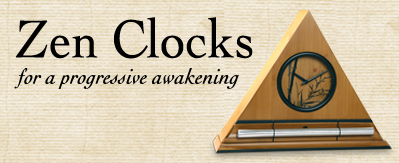 Wake up with gradual, beautiful acoustic chimes. The Zen Alarm Clock transforms your mornings and gets you started right, with a progressive awakening. Now & Zen – The Chime Alarm Clock Store
1638 Pearl Street
Boulder, CO 80302
(800) 779-6383
orders@now-zen.com
Posted in sleep, Sleep Habits
« Previous Page — « Previous Entries
Next Entries » — Next Page »
|
|
|
|